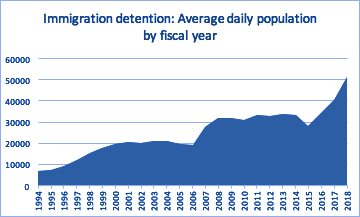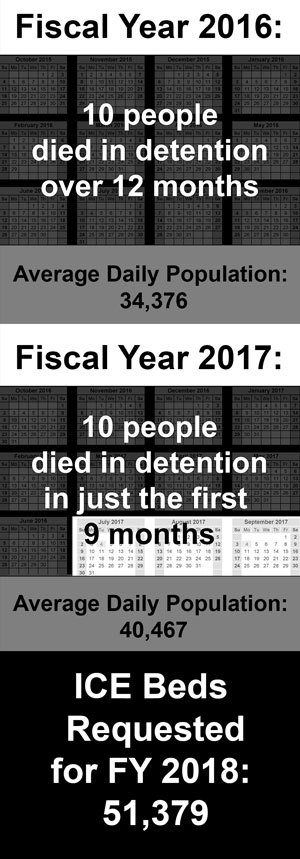“They transferred me to a privately run detention center… There, I experienced the worst days of my life… [T]he barracks resemble a stable for livestock… small, with metal bunks, worn-out rubber mattresses, wooden floors, bathrooms with the walls covered in green and yellow mold, weeds everywhere, and snakes and rats that come in the night… Honestly, it is hell.” – Martin Mendez Pineda, Mexican journalist and asylum seeker, in the Washington Post

The Trump administration has asked Congress to allocate $2.7 billion dollars to lock up a daily average of 51,379 immigrants in 2018 (see page 4 of the Department of Homeland Security’s budget request overview). This historic bid for the mass incarceration of immigrants would nearly double the average detention capacity of the past decade. Along with this expansion, the budget justification the administration sent to Congress reveals its plans to entirely abandon basic standards for health, safety and civil rights in immigration detention.
The immigration detention system endangers human lives and makes a mockery of due process. Here are seven reasons why Congress must reject the administration’s budget request, and three recommendations for elected officials seeking to protect the lives and due process rights of detained immigrants.
1. People are dying in immigration jails because of government negligence; more will die as the system grows. As of the publication of this post, seven people have died in immigration custody since President Trump was inaugurated. As many people have died in immigration detention in the first nine months of fiscal year 2017 as died in all of fiscal year 2016. The alarming rate of recent deaths has captured the attention of reporters. In May, Jean Jimenez-Joseph committed suicide after suffering in solitary confinement for 19 days in the Stewart Detention Center in Georgia. The day before he died, a visitation group concerned about his mental health attempted to visit him but was turned away. Many of the deaths that occur in immigration custody were preventable and have been attributed to medical negligence. Aggressive enforcement and ramped up detention will mean many more deaths.
2. The Department of Homeland Security (DHS) is unable to provide for the health and safety protections of those it detains. Oversight and accountability mechanisms are inadequate. The agency’s proposal to weaken existing standards will further endanger lives. Individuals in detention report receiving food with worms and insects and discolored water, according to a recent report by the Southern Poverty Law Center. Credible reports of abuse of force by officers and excessive use of segregation and lockdown are common. The current system of inspections and oversight is rife with loopholes and woefully inadequate to document and remedy egregious failures. Despite this overwhelming evidence of the need for strengthened standards, the administration is moving forward with plans to abandon civil detention standards for a significant percentage of all facilities. Weakened standards will mean deteriorating conditions and lives at risk.

3. The administration is expanding the use of a punitive system of incarceration for civil immigration violations. Immigration detention is civil. Yet DHS utilizes a sprawling network of jails to detain tens of thousands of immigrants every day in harsh conditions that are obviously punitive. Approximately 65% of all immigration detainees are held in private prisons and about 25% in county jails. The law does not permit ICE to use detention to punish immigrants, yet it happens in practice every day.
4. Under the Trump administration, asylum seekers face indiscriminate and prolonged detention. The administration is blatantly using the specter of jail to deter asylum seekers from seeking protection in the United States. Subsequent to the President’s Executive Order, DHS has systematically moved to jail asylum seekers for the duration of their proceedings, disregarding international law obligations not to punish those seeking protection from persecution (See Article 31 of the 1951 United Nations Convention Relating to the Status of Refugees). Medical and mental health experts agree that detention exacerbates the symptoms of depression, isolation, and post-traumatic stress disorder many asylum seekers are already experiencing. Increased funding for detention will mean more suffering for the men, women and children fleeing persecution to seek safety on our shores.
5. The detention system operates at odds with due process rights. Immigration detention facilities are located remotely, creating countless barriers to access to counsel and due process. More than four out of every five individuals in detention is unable to obtain legal representation in his or her deportation proceedings. Conditions of confinement are so punishing that individuals routinely abandon even the strongest claims to protection because they cannot bear one more day incarcerated.
6. Further expansion of the immigration detention system serves to line the pockets of private prison companies at the expense of immigrant communities. The ways in which private prison companies are incentivized to cut corners has been well documented. And yet, the private prison industry is this administration’s primary partner in seeking expansion, with CEOs and shareholders reaping vast rewards. The deprivation of liberty should never be driven by profit motives.
7. Funding immigration detention is bad policy; fund alternatives to detention, which are safer, cheaper, more compassionate, and effective. Alternatives to detention are supervised release programs that allow individuals to maintain their liberty and family unity during pending removal proceedings. These programs are vastly less expensive than what the Trump administration has asked Congress to spend on detention, and have proven extremely successful in ensuring that participants appear in court for their removal proceedings. In 2014, the Government Accountability Office examined ICE’s alternatives to detention program and found that from 2011 through 2013 over 99 percent of individuals enrolled in the program appeared at their court hearings. Pilot community-based supervision programs undertaken by ICE in partnership with non-profit organizations have achieved appearance rates of between 91 and 97 percent.
The immigration detention system is broken. The National Immigrant Justice Center calls on Members of Congress to respond:
- Appropriate limited funds to DHS for immigration detention, forcing a contraction rather than an expansion of detention;
- Engage in strong oversight of the immigration detention system through frequent information requests; and
- Demand robust detention standards and monitoring that protect lives and due process.

